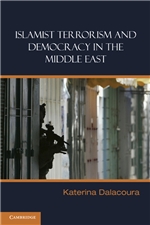Islamist Terrorism and Democracy in the Middle East
USIP had an in-depth discussion with Katerina Dalacoura on the launch of her USIP-funded book titled Islamist Terrorism and Democracy in the Middle East on December 7th from 3-4:30 at Carnegie.
 The putative relationship between political repression and terrorism remains a matter of active debate in scholarly and policymaking circles. Based on investigations into individual Islamist movements and the political environments in which they operate, this study assesses whether the emergence of Islamist terrorism is linked to the absence of political participation and repression.
The putative relationship between political repression and terrorism remains a matter of active debate in scholarly and policymaking circles. Based on investigations into individual Islamist movements and the political environments in which they operate, this study assesses whether the emergence of Islamist terrorism is linked to the absence of political participation and repression.
The U.S. Institute of Peace is pleased to sponsor an in-depth discussion with Dalacoura centered on her recently-published work.
Funded by a grant from USIP, the volume draws on a series of case studies that include al Qa'eda, Hamas, Hezbollah, Groupe Islamique Armé, Gamaa Islamiyya, the Jordanian and Egyptian Muslim Brotherhoods, the Tunisian Nahda Movement, the Turkish Justice and Development Party, and Iranian Islamist movements.
“Drawing on her deep knowledge of Middle East politics, Dalacoura powerfully challenges past assumptions about a simple link between democratic deficits and the spread of Islamist terrorism," said Thomas Carothers of the Carnegie Endowment for International Peace. "Conceptually rigorous, empirically rich, incisive and searching, this is a major study.”
Speakers
- Daniel Brumberg, Chair
U.S. Institute of Peace - Katerina Dalacoura, Author
London School of Economics and Political Science - Dafna Rand
Department of State - Eric Goldstein
Human Rights Watch



